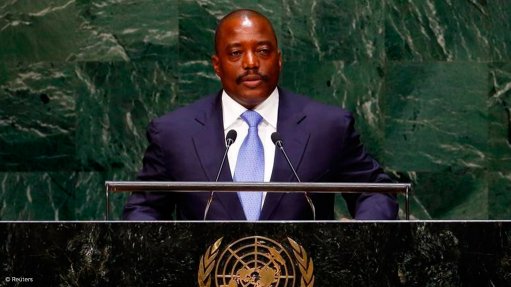
DRC President Joseph Kabila
Photo by: Reuters
Rights groups and opposition politicians have issued concern as Democratic Republic of Congo (DRC) President Joseph Kabila looks set to remain leader for another 14 months, having held power for the past 16 years.
After delaying a presidential vote because of violence, the Independent National Electoral Commission (CENI) on Sunday set a date for the election - December 23, 2018.
Elections were meant to take place in November 2016, but officials said the vote was postponed because of deadly violence in the Kasai region and logistical hurdles.
The country has seen widespread anger over what some see as President Kabila's refusal to relinquish power after his second full term ended in December 2016.
He had taken power after his father was assassinated in 2001, and was elected in 2006 and 2011.
According to the constitution, Kabila cannot seek a third term.
Shortly after Sunday's announcement, Felix Tshisekedi, opposition leader, called for protests.
The election commissions' calendar "will sound the death knell of the regime," Tshisekedi said, writing on Twitter.
The announcement came little more than one week after US Ambassador to the United Nations Nikki Haley's visit to DRC, who before meeting Kabila said elections should take place by the end of 2018.
"We knew elections would not be held this year. What is more surprising is the relatively arbitrary change in dates: the commission had initially said it would take them exactly 504 days after voter registration to hold elections," Jason Sterns, head of the Congo Research Group, told Al Jazeera. "Then suddenly, after Nikki Haley asked them to hold elections in 2018, they somehow cut that period down to 300 days.
"It appears they made that change just to satisfy donor pressure, with few guarantees whether this schedule will be respected." 'Fanciful' election calendar
The new president is expected to take oath on January 12, 2019. The electoral cycle, including local elections, should be completed by February 16, 2020.
Fight for Change (LUCHA), an activist group, said CENI's calendar was "fanciful" and called on the Congolese people to protest peacefully against the "shameful manoeuvre to save more time in Kabila and its regime in order to fulfill their will to remain indefinitely in power".
But US State Department spokesmen Heather Nauert said setting the date marks "a significant step toward realising [the DRC's] first peaceful, democratic transfer of power", and called on Kabila to respect the constitution, withdraw from the election and not seek a third term.
"While some diplomats could see in this calendar a sign of progress, a large number of Congolese are, rightly, sceptical," said Ida Sawyer, Human Rights Watch director for Central Africa. "Kabila entrenched his hold on power through corruption, large-scale violence, and brutal repression against the opposition, activists, journalists, and peaceful protesters.
"Security force officers went so far as to implement an apparently deliberate 'strategy of chaos' and orchestrated violence, especially in the southern Kasai region, where up to 5,000 people have been killed since August 2016."
Some have warned of more violence following the announcement of a new election, with protests expected.
"There could be tensions, possibly skirmishes ... Radical opponents are not going to leave this time without making noise," said Nkere Mutanda, political analyst and professor of political science at the University of Kinshasa.
Some 80 million people live in DRC, one of Africa's most volatile nations and one rich in mineral resources.
About 7.7-million are on the verge of starvation in the DRC, of whom 3.3-million are in Kasai, an eastern province where 1.4-million have been forced to flee their homes over the past year after clashes broke out between the Kamwina Nsapu armed group and security forces.
Olivier Kamitatu, spokesperson for the exiled tycoon Moise Katumbi, told Al Jazeera that the opposition will drive President Kabila from power by applying Article 64 of the constitution.
"We are going to have a short transition without Mr. Joseph Kabila before going to the elections," Kamitatu said.
For its part, the government attempted to quell dissent which it blamed on "foreign agents".
"Our compatriots of the so-called radical opposition and their friends in civil society should never lose sight of the hecatombs in which the internal tensions provoked by the instigation of ill-intentioned foreign agents," said Lambert Mende, communications minister and government spokesperson.
"Our duty to all, beyond our differences, is to adopt a citizen and republican attitude towards the difficulties our nation is facing."
He also on Wednesday blamed foreign greed for the country's resources, such as rubber and copper.